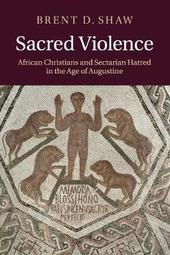
|
Sacred Violence: African Christians and Sectarian Hatred in the Age of Augustine
Paperback / softback
Main Details
| Title |
Sacred Violence: African Christians and Sectarian Hatred in the Age of Augustine
|
| Authors and Contributors |
By (author) Brent D. Shaw
|
| Physical Properties |
| Format:Paperback / softback | | Pages:930 | | Dimensions(mm): Height 227,Width 151 |
|
| Category/Genre | Church history
Roman Catholicism and Roman Catholic churches |
|---|
| ISBN/Barcode |
9780521127257
|
| Classifications | Dewey:939.703 |
|---|
| Audience | | Professional & Vocational | |
|---|
| Illustrations |
Worked examples or Exercises; Printed music items
|
|
Publishing Details |
| Publisher |
Cambridge University Press
|
| Imprint |
Cambridge University Press
|
| Publication Date |
1 September 2011 |
| Publication Country |
United Kingdom
|
Description
One route to understanding the nature of specifically religious violence is the study of past conflicts. Distinguished ancient historian Brent D. Shaw provides a new analysis of the intense sectarian battles between the Catholic and Donatist churches of North Africa in late antiquity, in which Augustine played a central role as Bishop of Hippo. The development and deployment of images of hatred, including that of the heretic, the pagan, and the Jew, and the modes by which these were most effectively employed, including the oral world of the sermon, were critical to promoting acts of violence. Shaw explores how the emerging ecclesiastical structures of the Christian church, on one side, and those of the Roman imperial state, on the other, interacted to repress or excite violent action. Finally, the meaning and construction of the acts themselves, including the Western idea of suicide, are shown to emerge from the conflict itself.
Author Biography
Brent D. Shaw is currently the Andrew Fleming West Professor of Classics at Princeton University. He has published widely on the regional history of the Roman empire - with particular emphasis on the North African provinces and the problem of violence in its historical contexts - in major journals including the Journal of Roman Studies, Past and Present and the American Historical Review. He has also written, with other Princeton faculty in history, a new world history text entitled Worlds Together, Worlds Apart.
Reviews'Shaw draws upon a knowledge and expertise in African History, secular as well as sacred, which is hard to match among his contemporaries, and certainly unequalled among those who are writing in English. His handling of the 'revolts' of Firmus, Gildo and Heraclian is as assured and authoritative as his treatment of the Circumcellions, which is, quite simply, the best available in any language.' Peter Garnsey, Professor of the History of Classical Antiquity, University of Cambridge '... a truly noble work that represents a very modern collection of insights into late antique North Africa and African Christianity ... the book summarises the many theories about North African Christianity and Donatism to emerge over recent decades but then also asserts a rather coherent set of insights by Shaw that will undoubtedly shape research for some time to come. In the expanding library of works on ancient North African Christianity Brent Shaw's book will be a must-have amidst the ranks of WHC Frend, Serge Lancel, and Maureen Tilley ... an indispensable addition to the growing sources available for fans of late antique research. Brent Shaw has set a new standard for efforts into the field of North African Christianity and Donatism and this book is indeed a very valuable new volume in an expanding area of interest ... I endorse the work vividly.' Ephemerides Theologicae Lovanienses 'Brent Shaw's study offers a compelling and meticulous history of violence for late Roman North Africa, with a focus on the 'sanctified violence' of the fourth and fifth centuries. Sacred Violence is an enormous, humane work of monumental importance for which Shaw should rightly receive many accolades. It is written with a verve and alacrity which given its length, is a remarkable achievement.' Nicholas J. Baker-Brian, The Journal of Roman Studies
|